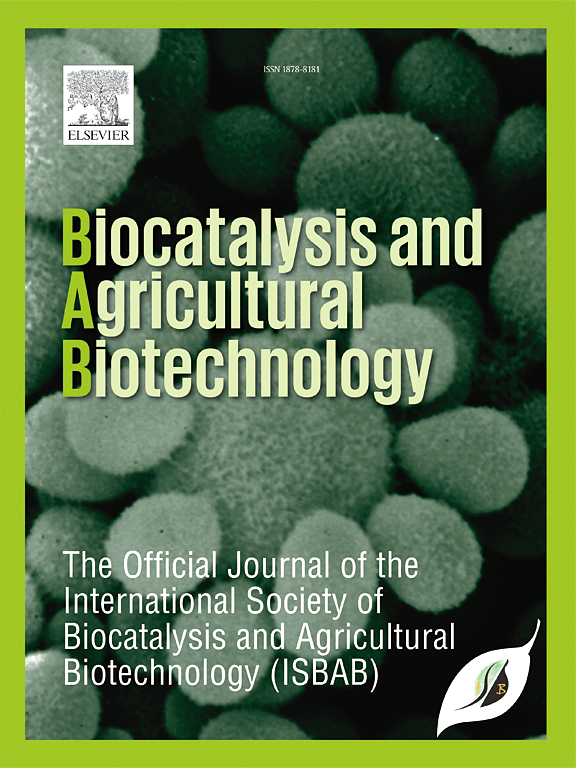Biogenically synthesized Moringa oleifera leaf extract-derived silver nanoparticles exhibit potent antimicrobial and anticancer effects via oxidative stress and apoptotic pathways in AGS gastric cancer cells
IF 3.4
Q2 BIOTECHNOLOGY & APPLIED MICROBIOLOGY
引用次数: 0
Abstract
Silver nanoparticles (AgNPs) possess anticancer and targeted drug delivery potential. When synthesized biogenically, their biocompatibility and therapeutic efficacy are improved through capping with bioactive compounds. This study explores the anticancer potential of silver nanoparticles (AgNPs) synthesized using bioactive compounds from Moringa oleifera (MOAgNPs) against AGS gastric cancer cells. UV–Vis spectrometry confirmed MOAgNP synthesis with peaks at 255.72 and 301.04 nm, while FT-IR revealed O-H and carbonyl groups crucial for nanoparticle stability; DLS analysis showed a narrow particle size distribution with an average diameter of 30–35 nm, consistent with TEM observations. Microscopy confirmed spherical nanoparticles with a diameter of 30–35 nm, while a zeta potential of −24.9 mV indicated colloidal stability. MOAgNPs demonstrated cytotoxicity with an IC50 of 55.213 μg/mL, inducing ROS generation, apoptosis, and cellular morphology changes. Downregulation of key proteins involved in energy metabolism and apoptosis highlighted MOAgNPs' ability to impair vital cellular functions and enhance the sensitivity of drug-resistant cancer cells, suggesting their potential as effective anticancer agents for gastric cancer treatment.

生物合成辣木叶提取物衍生的银纳米颗粒通过氧化应激和凋亡途径在AGS胃癌细胞中表现出强大的抗菌和抗癌作用
银纳米粒子(AgNPs)具有抗癌和靶向给药的潜力。当生物合成时,它们的生物相容性和治疗效果通过覆盖生物活性化合物而得到改善。本研究探讨了辣木生物活性化合物合成的银纳米颗粒(AgNPs)对胃癌细胞的抗癌作用。紫外-可见光谱分析证实了MOAgNP的合成,峰位于255.72和301.04 nm处,而傅里叶-红外光谱显示了O-H和羰基对纳米颗粒的稳定性至关重要;DLS分析显示其粒径分布较窄,平均粒径为30 ~ 35 nm,与TEM观察结果一致。显微镜下证实纳米颗粒直径为30-35 nm, zeta电位为- 24.9 mV,表明胶体稳定性。MOAgNPs表现出细胞毒性,IC50为55.213 μg/mL,诱导ROS生成、细胞凋亡和细胞形态改变。下调参与能量代谢和凋亡的关键蛋白,表明MOAgNPs能够损害重要细胞功能,增强耐药癌细胞的敏感性,这表明它们可能是治疗胃癌的有效抗癌药物。
本文章由计算机程序翻译,如有差异,请以英文原文为准。
求助全文
约1分钟内获得全文
求助全文
来源期刊

Biocatalysis and agricultural biotechnology
Agricultural and Biological Sciences-Agronomy and Crop Science
CiteScore
7.70
自引率
2.50%
发文量
308
审稿时长
48 days
期刊介绍:
Biocatalysis and Agricultural Biotechnology is the official journal of the International Society of Biocatalysis and Agricultural Biotechnology (ISBAB). The journal publishes high quality articles especially in the science and technology of biocatalysis, bioprocesses, agricultural biotechnology, biomedical biotechnology, and, if appropriate, from other related areas of biotechnology. The journal will publish peer-reviewed basic and applied research papers, authoritative reviews, and feature articles. The scope of the journal encompasses the research, industrial, and commercial aspects of biotechnology, including the areas of: biocatalysis; bioprocesses; food and agriculture; genetic engineering; molecular biology; healthcare and pharmaceuticals; biofuels; genomics; nanotechnology; environment and biodiversity; and bioremediation.
 求助内容:
求助内容: 应助结果提醒方式:
应助结果提醒方式:


